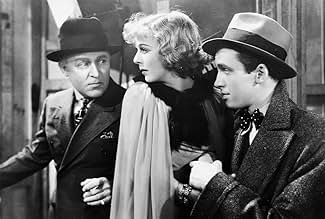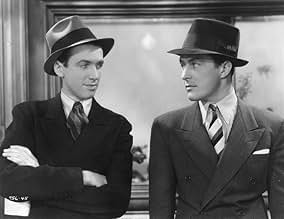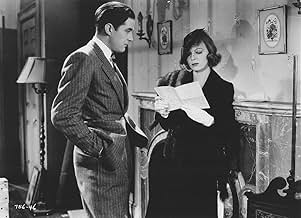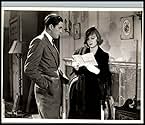Ajouter une intrigue dans votre langueA young married couple's relationship becomes strained when he is assigned overseas as a foreign correspondent and she becomes a major stage star.A young married couple's relationship becomes strained when he is assigned overseas as a foreign correspondent and she becomes a major stage star.A young married couple's relationship becomes strained when he is assigned overseas as a foreign correspondent and she becomes a major stage star.
- Réalisation
- Scénario
- Casting principal
- Récompenses
- 3 victoires au total
Ray Milland
- Tommy Abbott
- (as Raymond Milland)
Ronnie Cosby
- Kit
- (as Ronald Cosbey)
Arthur Aylesworth
- Secretary
- (non crédité)
King Baggot
- Character man
- (non crédité)
Tommy Bond
- Pesky Kid
- (non crédité)
Harry C. Bradley
- Desk Clerk
- (non crédité)
Tyler Brooke
- Author
- (non crédité)
Daisy Bufford
- Maid
- (non crédité)
Jack Cheatham
- Taxi Driver
- (non crédité)
Jack Daley
- Conductor
- (non crédité)
John Dilson
- Stage Manager
- (non crédité)
Charles Fallon
- Prof. Dindet
- (non crédité)
Avis à la une
This is a very progressive film with themes way ahead of the times even for today. What does that mean? Usually when someone calls a film "progressive" it means it's hypersexed, banned by the Pope or has gratuitous shots of belly buttons. Right, well, none of that. NEXT TIME WE LOVE is progressive because it delves into interpersonal issues that simply "didn't exist" in the golden age of Hollywood.
A wife who chooses career over family? Preposterous. A husband/father who neglects the upbringing of his child? Outrageous. A marriage that is mutually tolerant of infidelity? Sacrilegious. Hollywood has historically depicted the marriage ceremony as the proverbial "happily ever after"; yet in this film we get a sober and realistic view of how life really works.
There are no dramatic fireworks, no cartoonish liaisons, no screaming or breaking things like we might get in a modern film dealing with this subject. Instead, it's extremely subtle and believable. There's not much flashy plot to sink your MTV-starved mind into, but if instead you like to digest your films slowly and comprehend the meaning behind every gesture--the tension in Margaret Sullivan's spine, the repressed torment in Jimmy Stewart's posture, the way a cigarette can be worth a thousand words when lit at the perfect moment--then this film is for you.
One thing worth mentioning... this is one of the few films that handles the aging of characters in a credible manner. Margaret goes from a giddy schoolgirl to a mature woman of the world. Jimmy goes from a brash adventurer to a pensive introvert. The makeup, hairstyles, clothes and especially the way the actors carry themselves convey the passage of time as the film progresses over a decade (perhaps mirroring the awakening of a nation from the roaring 20s to the tougher times that followed). The climactic hotel meeting near the end of the film presents two completely different personalities from what we originally met; you could almost believe that it was played by two new actors, but no, we owe it all to the fantastic acting & direction of this film.
A wife who chooses career over family? Preposterous. A husband/father who neglects the upbringing of his child? Outrageous. A marriage that is mutually tolerant of infidelity? Sacrilegious. Hollywood has historically depicted the marriage ceremony as the proverbial "happily ever after"; yet in this film we get a sober and realistic view of how life really works.
There are no dramatic fireworks, no cartoonish liaisons, no screaming or breaking things like we might get in a modern film dealing with this subject. Instead, it's extremely subtle and believable. There's not much flashy plot to sink your MTV-starved mind into, but if instead you like to digest your films slowly and comprehend the meaning behind every gesture--the tension in Margaret Sullivan's spine, the repressed torment in Jimmy Stewart's posture, the way a cigarette can be worth a thousand words when lit at the perfect moment--then this film is for you.
One thing worth mentioning... this is one of the few films that handles the aging of characters in a credible manner. Margaret goes from a giddy schoolgirl to a mature woman of the world. Jimmy goes from a brash adventurer to a pensive introvert. The makeup, hairstyles, clothes and especially the way the actors carry themselves convey the passage of time as the film progresses over a decade (perhaps mirroring the awakening of a nation from the roaring 20s to the tougher times that followed). The climactic hotel meeting near the end of the film presents two completely different personalities from what we originally met; you could almost believe that it was played by two new actors, but no, we owe it all to the fantastic acting & direction of this film.
This is a very early Stewart film that really gave him his first big break with a leading role. Sixth billed in "Murder Man" and fifth billed in "Rose Marie", he was barely visible in his first two features at MGM. On loan to Universal, here he was teamed with Margaret Sullivan, and together they play a couple that marries on impulse and then begin pursuing their own individual careers - she is an actress, he is a journalist. Conflict develops when her career takes off and his does not. This film is very typical of those melodramas that were so common in the 1930's, but it is still interesting to see what Stewart does with this early role in his career. Stewart and Sullivan have a better chance to show off their chemistry in 1938's "Shopworn Angel", still it is a good look at a film made right before the Laemmle's lost Universal to creditors. I'd recommend it mainly for the performances.
Stewart's first breakout role. The magnetism between Sullavan and Stewart is undeniable in this sophisticated story about a couple whose careers don't quite mesh. Their divergent careers inevitably causes their marriage to be a rocky one with many ups and downs. The plot, although a progressive one ahead of its time, is not an appealing one. I wanted to like this movie, but the plot kept me from it. It fell flat and seemed rushed.
In New York, the rookie newsman Christopher "Chris" Tyler (James Stewart) dreams on becoming a famous journalist. When his girlfriend Cicely (Margaret Sullavan) spends a couple of days with him, they decide to get married and Cicely leaves college. Chris's best friend Tommy Abbott (Raymond Milland) is his best man and becomes a family's friend. Chris has his great chance when his editor Frank Carteret (Robert McWade) sends him to Rome assigned as a foreign correspondent. Cicely stays in New York with Tommy and does not tell to Chris that she is pregnant. When she delivers the baby Kit, Chris celebrates and loses a big scoop and his boss fires him. Chris falls in disgrace and the couple has economic difficulties; however Tommy lends money to Cicely and offers an opportunity on the stage as an actress. Cicely is hired and becomes successful and Chris is depressed with the situation. Cicely seeks out Frank Carteret and explains the situation, and he offers a job opportunity to Chris in Russia. He accepts the job but Cicely stays in New York with their son. Along the years, their marriage ends with the distance, but they are still in love with each other.
"Next Time We Love" is a romantic melodrama ahead of time with a mature story of career conflict with marriage, causing separation, reconciliation and infidelity of the two leads. This theme is impressive for a 1936 movie, where usually the woman is submissive and dependable of man's possessions. My vote is seven.
Title (Brazil): "Amemos Outra Vez" ("We Love Again")
"Next Time We Love" is a romantic melodrama ahead of time with a mature story of career conflict with marriage, causing separation, reconciliation and infidelity of the two leads. This theme is impressive for a 1936 movie, where usually the woman is submissive and dependable of man's possessions. My vote is seven.
Title (Brazil): "Amemos Outra Vez" ("We Love Again")
Sight unseen this movie has a number of factors in its favor: 1) it stars two of the most charismatic performers of Hollywood's Golden Age, James Stewart & Margaret Sullavan, paired for the first time; 2) it features the underrated Ray Milland as Jimmy's best friend, who becomes the third player in their romantic triangle; 3) several of Hollywood's familiar character actors appear in supporting roles (Grant Mitchell, Hattie McDaniel, Christian Rub, etc.), and 4) its story was born in the typewriter of the legendary Preston Sturges, one of the all-time great screenwriters. According to various biographies of Sturges he spent a couple of weeks on the first draft of this drama while simultaneously cranking out a comedy for Carole Lombard called Love Before Breakfast. Sturges' script for Next Time We Love was then handed off to an obscure writer named Melville Baker who revised it, but in the end only Baker received screen credit. It would appear that this project meant little to Sturges, but, bearing in mind the memorable results when Margaret Sullavan took the title role of his brilliant adaptation of The Good Fairy in 1935, I sat down to watch this one hoping it might also be something special.
Unfortunately, and despite a decent opening half-hour or so, this film ultimately disappoints. Stewart and Sullavan have good chemistry and make a believable couple. We follow the course of their relationship with interest as they marry on impulse and Stewart aggressively pursues a career in journalism while Sullavan takes a more casual interest in stage acting, while best friend Milland maintains a steady presence in the background. Stewart & Sullavan have a baby, but trouble soon develops: her career in the theater suddenly takes off just as his progress at the newspaper hits a brick wall. Tension mounts as she becomes the breadwinner after he screws up a major assignment and is fired. They separate, and Sullavan flourishes while Stewart avoids coming home and stays out of the picture. Milland, at this point, finally steps forward and makes his feelings known.
More plot twists come along, but for me the movie starts to fizzle along about the time Sullavan's acting career takes off. Important events occur too abruptly, without the appropriate build-up: all of a sudden, she's a famous and powerful Broadway star. It looks as if some backstage scenes were filmed but then cut, suggested by the fact that Grant Mitchell, who plays a theatrical producer, receives fourth billing in the credits though he appears in only one brief scene. From that point onward Sullavan's stardom seems unreal while the behavior of Stewart's character becomes increasingly melodramatic and unbelievable. In the later scenes none of the main characters behave like recognizable human beings, and despite the best efforts of these estimable actors we no longer buy anything they're saying or doing by the climax. The story raises a provocative issue, i.e. the conflict that results when a wife earns more money than her husband and thus wields more power, but the filmmakers chickened out without really addressing the matter, choosing a sappy "Hollywood" resolution over anything genuinely satisfying.
Next Time We Love is fairly interesting nonetheless, worth seeing if you enjoy Hollywood melodramas of the '30s and certainly if you're a fan of the stars, but in the end it doesn't amount to much. Fans of Preston Sturges will be hard pressed to recognize his contribution, and may prefer to skip this one and enjoy one of his more characteristic works instead.
Unfortunately, and despite a decent opening half-hour or so, this film ultimately disappoints. Stewart and Sullavan have good chemistry and make a believable couple. We follow the course of their relationship with interest as they marry on impulse and Stewart aggressively pursues a career in journalism while Sullavan takes a more casual interest in stage acting, while best friend Milland maintains a steady presence in the background. Stewart & Sullavan have a baby, but trouble soon develops: her career in the theater suddenly takes off just as his progress at the newspaper hits a brick wall. Tension mounts as she becomes the breadwinner after he screws up a major assignment and is fired. They separate, and Sullavan flourishes while Stewart avoids coming home and stays out of the picture. Milland, at this point, finally steps forward and makes his feelings known.
More plot twists come along, but for me the movie starts to fizzle along about the time Sullavan's acting career takes off. Important events occur too abruptly, without the appropriate build-up: all of a sudden, she's a famous and powerful Broadway star. It looks as if some backstage scenes were filmed but then cut, suggested by the fact that Grant Mitchell, who plays a theatrical producer, receives fourth billing in the credits though he appears in only one brief scene. From that point onward Sullavan's stardom seems unreal while the behavior of Stewart's character becomes increasingly melodramatic and unbelievable. In the later scenes none of the main characters behave like recognizable human beings, and despite the best efforts of these estimable actors we no longer buy anything they're saying or doing by the climax. The story raises a provocative issue, i.e. the conflict that results when a wife earns more money than her husband and thus wields more power, but the filmmakers chickened out without really addressing the matter, choosing a sappy "Hollywood" resolution over anything genuinely satisfying.
Next Time We Love is fairly interesting nonetheless, worth seeing if you enjoy Hollywood melodramas of the '30s and certainly if you're a fan of the stars, but in the end it doesn't amount to much. Fans of Preston Sturges will be hard pressed to recognize his contribution, and may prefer to skip this one and enjoy one of his more characteristic works instead.
Le saviez-vous
- Anecdotes"Lux Radio Theater" broadcast a 60 minute radio adaptation of the movie on November 7, 1938 with Margaret Sullavan reprising her film role.
- Citations
Frank Carteret: It's amazing! The things people ask of love. They expect it to protect them, keep them from being bored, make them work harder. In fact , they want everything except love.
- Versions alternativesCurrent prints of this film feature the Universal logo created in late 1936, and say "The New Universal Presents". That is because they were made after studio founder Carl Laemmle was ousted from Universal Studios and the takeover of the studio by a new conglomerate. The picture was actually released before Laemmle left. That is why the "The End" credit features an airplane circling the globe, the logo that Universal used while Laemmle was in power.
- ConnexionsFeatured in Great Performances: James Stewart: A Wonderful Life (1987)
Meilleurs choix
Connectez-vous pour évaluer et suivre la liste de favoris afin de recevoir des recommandations personnalisées
- How long is Next Time We Love?Alimenté par Alexa
Détails
- Date de sortie
- Pays d’origine
- Langue
- Aussi connu sous le nom de
- Next Time We Love
- Lieux de tournage
- Société de production
- Voir plus de crédits d'entreprise sur IMDbPro
- Durée1 heure 27 minutes
- Couleur
- Rapport de forme
- 1.37 : 1
Contribuer à cette page
Suggérer une modification ou ajouter du contenu manquant



































